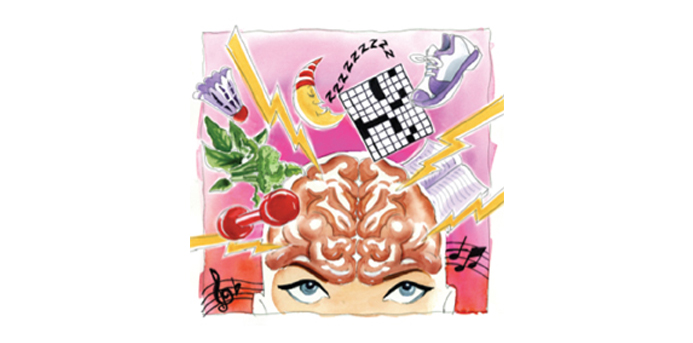The brain-strengthening trend has adults attending memory camps, doing brain aerobics, playing board and card games, using new computer programs, reading books on brain health and completing brain exercises.
Think about it.
We exercise to keep our hearts strong. We eat more leafy green things to maintain a healthy body. Some of us even color our hair, use revitalizing face creams and dress in the latest fashions—all to maintain a youthful façade.
But what do we do to keep our brains in tip-top shape?
Can’t remember?
To make certain they can remember, adults are increasingly working on strengthening their brains. The trend has them attending memory camps, doing brain aerobics, playing board and card games, using new computer programs, reading books on brain health and completing brain exercises.
“The brain hungers for novelty, for new things,” says Joni Gatz-Bauman, a nationally recognized brain aerobics instructor and speaker who appears frequently at North Shore locations and conducts classes for Marbles: The Brain Store (847-673-9000).
Relax, you don’t have to pack a swimsuit or mosquito spray for memory camp or put on sweats for brain aerobics. But you can learn skills and tricks for remembering, and the “aerobics” involve problem-solving skills and games.
As the first wave of post-World-War-II baby boomers adjust to being in their 60s, brain health is fast emerging as an important lifestyle exercise regimen. For many it is becoming part of a daily routine like dieting and exercise—both of which, by the way, help keep a brain healthy.
“The healthier you are, the healthier the brain,” says Barcy Grauer of Highland Park, who leads memory sharpening classes for the North Shore Senior Center.
Brain health is not an issue just for seniors. You probably don’t remember, but your memory began to dull, ever so little, somewhere in your late 20s or 30s. There is no consensus in scientific literature about when this process begins, but there is agreement that it begins much earlier in life than we think.
A wide range of factors negatively impact memory, says Grauer, a trained brain health instructor and a retired career development specialist. Among them:
- Negative expectations
- Lack of organization
- Stress and anxiety
- Multi-tasking
The good news is that there are things we can do throughout our lives to keep our minds sharp, improve our memories and remember where we left the car keys.
The even better news is that it is never too late to start. Hang on to that thought because “most forgetting occurs within 24 hours of learning,” Grauer says.
- Sharpen Your Noggin
- Exercise regularly—research shows aerobic activity is good for the brain.
- Play bridge, canasta, mahjong or Scrabble, and do Sudoku or crossword puzzles. These activities do for the brain what walking on a treadmill does for the heart.
- Maintain social contacts.
- Learn to speak a new language or play a musical instrument to build new connections in the brain.
- Stick to a low-fat, low-cholesterol diet, and eat foods rich in antioxidants such as dark vegetables and fruits.
Helpful Hint
Want to remember where you put your glasses or car keys?
When you set them down announce aloud to yourself where you put them. This will improve your chances of finding them when they are needed next.
Books that stimulate brain activity or that promote brain health:
Your Brain Health Lifestyle by Dr. Paul Nussbaum
The Mature Mind: The Positive Power of the Aging Brain by Dr. Gene D. Cohen
The Brain That Changes Itself: Stories of Personal Triumph from the Frontiers of Brain Science (James H. Silberman Books) Dr. Norman Dodge
YOU: The Owner’s Manual, Updated and Expanded Edition: An Insider’s Guide to the Body that Will Make You Healthier and Younger by Mehmet C. Oz
YOU: Staying Young: The Owner’s Manual for Extending Your Warranty by Michael F. Roizen
Sex on the Brain: 12 Lessons to Enhance Your Love Life by Dr. Daniel G. Amen M.D.
Brain Games (multiple volumes)
Books containing collections of crosswords or Sudoku


